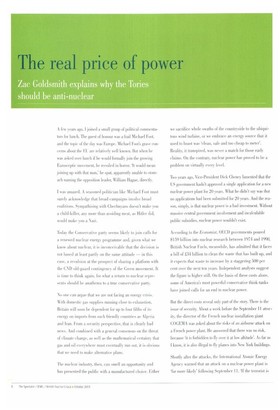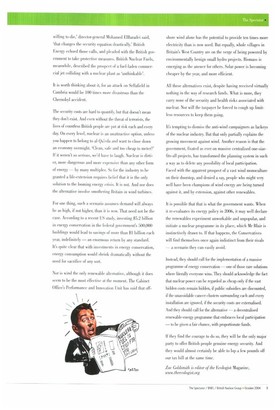he real price of power
Zac Goldsmith explain hy th should be anti-nuclear
A few years ago, I joined a small group of political commentators for lunch. The guest of honour was a frail Michael Foot. and the topic of the day was Europe. Michael Foot's grave concerns about the EL are relatively well known. But when he was asked over lunch if he would formally join the growing Eurosceptic muverrient, he recoiled in horror. It would mean joining up with that man,' he spat. apparently unable to stomach naming the opposition leader, William Hague, directly.
I was amazed. A seasoned politician like Michael Foot must surely acknowledge that broad campaigns involve broad coalitions. Sympathising with Chechnyans doesn't make you a child-killer, any more than avoiding meat, as Hitler did, would make you a Nazi.
Today the Conservative party seems likely to join calls for a renewed nuclear energy programme and, given what we know about nuclear, it is inconceivable that the decision is not based at least partly on the same attitude — in this case, a revulsion at the prospect of sharing a platform with the CND old-guard contingency of the Green movement. It is time to think again, for what a return to nuclear represents should be anathema to a true conservative party.
No one can argue that we are not facing an energy crisis. With domestic gas supplies running close to exhaustion. Britain will soon be dependent for up to four fifths of its energy on imports from such friendly countries as Algeria and Iran. From a securityperspective, that is clearly had news. And combined with a general consensus on the threat of climate change, as well as the mathematical certainty that gas and oil everywhere must eventually run out, it is obvious that we need to make alternative plans.
The nuclear industry., then, can smell an opportunity and has presented the public with a manufactured choice. Either we sacrifice whole swaths of the countryside to the ubiquitous wind turbine, or we embrace an energy source that it used to boast was 'clean, safe and too cheap to meter'. Reality, it transpired, was never a match for those early claims. On the contrary, nuclear power has proved to be a problem on virtually every level,
Two years ago, Vice-President Dick Cheney lamented that the US government hadn't approved a single application for a new nuclear power plant for 20 years, What he didn't say was that no applications had been submitted for 20 years. And the reason, simply, is that nuclear power is a had investment. Without massive central government involvement and incalculable public subsidies, nuclear power wouldn't exist.
According to the Economist, OECD governments poured $159 billion into nuclear research between 1974 and 1998. British Nuclear Fuels, meanwhile, has admitted that it faces a bill of £34 billion to clean the waste that has built up, and it expects that waste to increase by a staggering 500 per cent over the next ten years. Independent analysts suggest the figure is higher still. On the basis of these costs alone, some of America's most powerful conservative think-tanks have joined calls for an end to nuclear power.
But the direct costs reveal only part of the story. There is the issue of security. About a week before the September 11 atrocity, the director of the French nuclear installation giant COCEMA was asked about the risks of an airborne attack On a French power plant. He answered that there was no risk, because 'it is forbidden to fly over it at low altitude'. As far as I know, it is also illegal to fly planes into New York buildings.
Shortly after the attacks, the International Atomic Energy Agency warned that an attack on a nuclear power plant is 'far inure likely' following September II. `If the terrorist is willing to die,' director-general Mohamed ElBaradei said, that changes the security equation drastically.' British Energy echoed those calls, and pleaded with the British government to take protective measures. British Nuclear Fuels, meanwhile, described the prospect of a fuel-laden commercial jet colliding with a nuclear plant as 'unthinkable'.
It is worth thinking about it, for an attack on Seilafield in Cumbria would be 100 times more disastrous than the Chernobyl accident.
The security costs are hard to quantify, hut that doesn't mean they don't exist. And even without the threat of terrorists, the lives of countless British people are put at risk each and every day. On every level, nuclear is an unattractive option, unless you happen to belong to al-Qu'eda and want to close down an economy overnight. 'Clean, safe and too cheap to meter?' If it weren't so serious, we'd have to laugh. Nuclear is dirtier, more dangerous and more expensive than any other form of energy — by many multiples. So for the industry to he granted a life-extension requires belief that it is the only solution to the looming energy crisis. It is not. And nor does the alternative involve smothering Britain in wind turbines.
For one thing, such a scenario assumes demand will always be as high, if not higher, than it is now. 'Mat need not be the case. According to a recent US study, investing $5.2 billion in energy conservation in the federal government's 500,000 buildings would lead to savings of more than $1 billion each year, indefinitely — an enormous return by any standard. It's quite clear that with investments in energy conservation, energy consumption would shrink dramatically without the need for sacrifice of any sort.
Nor is wind the only renewable alternative, although it does seem to be the most effective at the moment, The Cabinet Office's Performance and Innovation Unit has said that off shore wind alone has the potential to provide ten times more electricity than is now used. But equally, whole villages in Britain's West Country are on the verge of being powered by environmentally benign small hydro projects. Biomass is emerging as the answer for others. Solar power is becoming cheaper by the year, and more efficient.
All these alternatives exist, despite having received virtually nothing in the way of research funds. What is more, they carry none of the security and health risks associated with nuclear. Nor will the taxpayer he forced to cough up limitless resources to keep them going.
It's tempting to dismiss the anti-wind campaigners as lackeys of the nuclear industry. But that only partially explains the growing movement against wind. Another reason is that the government, fixated as ever on massive centralised one-sizefits-all projects, has transformed the planning system in such a way as to delete any possibility of local participation. Faced with the apparent prospect of a vast wind monoculture on their doorstep, and denied a say, people who might very well have been champions of wind energy are being turned against it, and by extension, against other renewables.
It is possible that that is what the government wants. When it re-evaluates its energy policy in 2006, it may well declare the renewables experiment unworkable and unpopular, and initiate a nuclear programme in its place, which Mr Blair is instinctively drawn to. If that happens, the Conservatives will find themselves once again indistinct from their rivals — a scenario they can easily avoid.
Instead, they should call for the implementation of a massive programme of energy conservation one of those rare solutions where literally everyone wins. They should acknowledge the fact that nuclear power can be regarded as cheap only if the vast hidden costs remain hidden, if public subsidies are discounted, if the unavoidable cancer clusters surrounding each and every installation are ignored, if the security costs are externalised.
And they should call for the alternative a decentralised renewable-energy programme that embraces local pku-ficipafion —to be given a fair chance, with proportionate funds.
If they find the courage to do so, they will be the only major party to offer British people genuine energy security. And they would almost certainly be able to lop a few pounds off our tax bill at the same time.
Zac Goldsmith is editor of the Ecologist Magazine, wiew.theecologist.org



















































































































 Previous page
Previous page